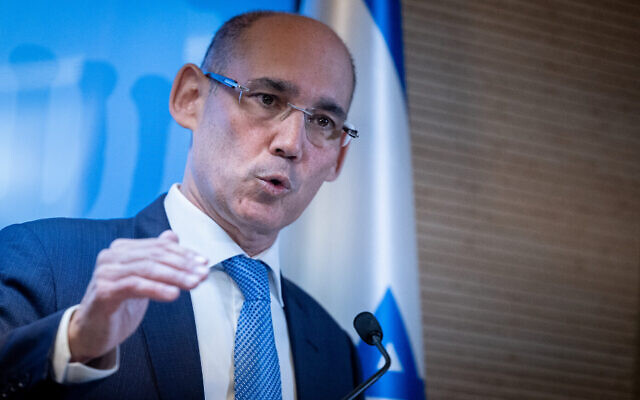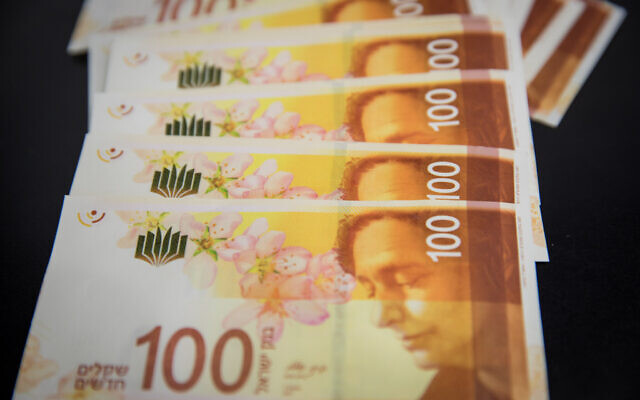Battling inflation, Bank of Israel hikes interest rates to 4.25%, highest since 2008
Central bank lifts borrowing costs by 50 basis points citing inflation above 5%, shekel depreciation and concerns about fiscal expansion and wages
Sharon Wrobel is a tech reporter for The Times of Israel.

The Bank of Israel on Monday increased the benchmark interest rate for the eighth straight meeting, raising its key lending rate by 50 basis points to 4.25 percent, the highest level since 2008, as the central bank battles rising inflation pressure and a weakening shekel.
The central bank’s monetary committee decided to lift the benchmark rate to 4.25% from 3.75%. The move comes after inflation unexpectedly quickened in January amid robust economic growth and as uncertainty over the repercussions of the proposed changes to Israel’s legal system led to a weakening of the shekel. The local currency has weakened about 3% against the dollar so far in February.
“The Israeli economy is recording strong economic activity, accompanied by a tight labor market and an increase in the inflation environment,” the central bank said in the rate decision statement. “The Committee has therefore decided to continue the process of increasing the interest rate.”
“Since the previous policy decision, exchange rates have been characterized by considerable volatility — in the beginning of the intermeeting period the shekel strengthened, and later on the trend changed and the shekel depreciated by approximately 5% in the last month,” it added in the statement.
The Bank of Israel has steadily raised its benchmark interest rate from a record low of 0.1% last April to 4.25%, in a bid to rein in inflation which has been hovering above 5% and bring it back into the government’s target range of between 1% to 3%. Meanwhile, a weaker shekel makes imported goods more expensive which in turn fuels consumer prices, such as the cost of gasoline.
“The extent of fiscal expansion and the development of wages will have an impact on the inflation rate’s convergence to its target,” the Bank of Israel cautioned in Monday’s announcement.

After the announcement, Foreign Minister Eli Cohen panned the bank’s decision to hike the interest rate.
“I asked my friend, Finance Minister Bezalel Smotrich, to put together a plan with the Bank of Israel governor to stop interest rate rises,” Cohen, a member of the ruling Likud party, wrote on Twitter on Monday.
Arguing that inflation was moderating, Cohen charged that “there was no justification for raising the interest rate today,” which he said would lead to further “abuse” of Israelis with mortgages.
David Bitan, also of the Likud and chair of the Economic Affairs Committee, took aim at Bank of Israel Governor Amir Yaron’s decision, calling on him to restrain the interest rate hikes, “even if this will prolong the lowering of inflation… the public is not up to the challenge.”
“The cost of living is skyrocketing. [With the current policy] we may beat inflation, but the victims will be the citizens of Israel,” Bitan said.
Smotrich later defended the bank in a statement posted in both English and Hebrew on his Twitter account.
“The independence of Israel’s central bank is fundamental for our strong and innovative economy. As finance minister, I stand firmly against populist statements threatening the Bank of Israel’s independence,” Smotrich said. The Hebrew statement also acknowledged that the rate hike “does make it difficult for many households.”
Economists at Bank Leumi, Bank Hapoalim, Israel Discount Bank, and Leader Capital Markets are among forecasters who had expected a hike of 0.5% and going forward estimate that borrowing costs will need to remain above 4% throughout the year amid rising inflationary pressure.
“If the shekel weakens further, impacting the prices of imported goods, this may further contribute to “sticky” inflation, which will not decline at the desired pace back towards the price stability target (1-3%),” Bank Leumi chief economist Gil Bufman wrote in a note following Monday’s rate decision. “Under these circumstances, the Bank of Israel is expected to continue raising interest rates at the upcoming decision at the beginning of April by 25 basis points, to 4.5%.”
“However if shekel weakening, alongside other factors, is reflected in an additional increase in inflation, and it remains around 5%, then the scope of further interest rate hikes is expected to be higher,” Bufman added.
Despite the Bank of Israel’s steady interest rate hikes in recent months, the consumer price index (CPI), a measure of inflation that tracks the average cost of household goods, rose by 0.3% in January, bringing the annual rise over the previous 12 months to 5.4%, the highest level since 2008, according to data released by the Central Bureau of Statistics on February 15. Economists had expected the January figures to stand at 0.1% at most.
Israel’s economy expanded 6.5% in 2022 growing at a slower pace than the fast 8.6% expansion in 2021, the statistics bureau said Thursday. Gross domestic product rose a seasonally adjusted, annualized 5.8% in the fourth quarter of 2022 surpassing analysts’ expectations. In 2022, the average growth among OECD countries was 2.8%.
As early as last month, central bank economists said they expected the inflation rate to ease to 3% over the coming year, and move to 2% in 2024. The economy is expected to grow at an annual rate of 2.8% in 2023 and by 3.5% in 2024, according to Bank of Israel estimates.
In recent weeks, concern among investors has grown that the government proposals currently being advanced to curtail the power of the judiciary would weaken Israel’s justice system and negatively impact its credit rating, which in turn would harm the country’s prosperous economy and its local currency and trigger the start of an outflow of funds.
“If the government continues to advance the legislation in its current from, the pressure on the exchange rate [shekel] will increase and is expected to lead to an increase in the inflation environment which supports a longer interest rate hike cycle,” IBI investment house chief economist Rafi Gozlan wrote in a note to investors.
Bank of Israel chief Yaron also addressed the impending judicial reforms, telling the Kan public broadcaster on Monday that an independent Bank of Israel is “crucial” to the country’s economy.
“We know, and there is a lot of research in the economic world that shows that the independence and strength of institutions are crucial components in economic development and prosperity,” he said.
Noting that international finance institutions are looking into the potential economic impact of the proposed changes to the judiciary, Yaron told Kan: “It’s really important to safeguard these characteristics, the independence and strength of these institutions, in any move that is advanced.”
Going forward, Bank Hapoalim chief strategist Modi Shafrir cited shekel weakness as one of the main risk factors for higher inflation in the coming year.
“There is fear of continued shekel devaluation fueled by concerns about the outflow of funds of Israeli citizens and foreign capital, if a compromise is not reached on the legal reform,” Shafrir wrote in a research note.
A number of local firms and startups have, at the request of their foreign investors, already started to shift money out of local bank accounts to diversify risk and hedge their assets before the planned reforms are set to be approved.
“It is difficult to quantify the extent of capital movements abroad by Israeli households and businesses, but it is a gradual process that is expected to affect the shekel,” said Jonathan Katz, macro strategist for Leader Capital Markets. “In the current environment, institutions will increase their holdings in foreign stocks at the expense of Israeli ones as well as their exposure to foreign exchange.”
“In addition, real investments into the Israeli economy are already in considerable decline this year. Without a reasonable compromise in the reform, the devaluation trend will continue, the inflation environment will rise and with it the Bank of Israel’s interest rate,” according to Katz.










